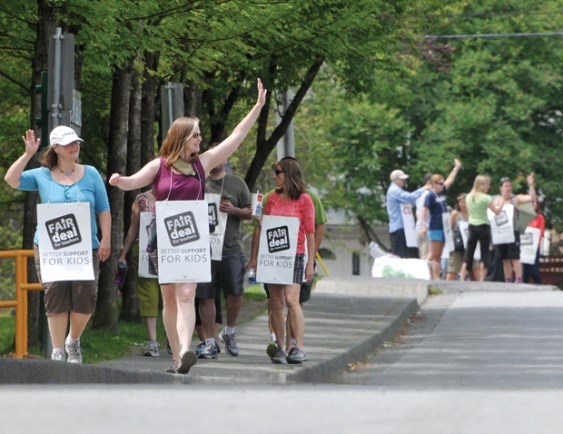Whether B.C. teachers are carrying pointers or picket signs on Sept. 2 may hinge on negotiations with the province scheduled for today.
With less than a month before the first day of school, West Vancouver teachers association president Rob Millard said he's "cautiously optimistic" a deal can be reached.
Both bargaining teams are slated to attend the meeting, which may be a sign of thaw in the frosty relationship between the B.C. Teachers' Federation and the B.C. Public School Employers' Association, according to Millard.
"I don't think they'd be meeting if there wasn't some sort of understanding," he said.
The new deal needs to address the "big deterioration" in student resources over the years, according to North Vancouver Teachers' Association President Carolyn Pena.
"For teachers in North Van, really we want to know that there's going to be supports in the classroom, that we're not going to see further and further cuts," she said.
Those cuts have resulted in fewer resources for students learning English as well as children with learning disabilities, according to Pena.
Class size and composition are "the big money ticket," according to Millard.
"Even Minister of Education (Peter Fassbender) acknowledges that composition is a problem. He hasn't quite got the class size thing down yet," Millard said.
What were homogenous classrooms 20 years ago have become a complex "mixed bag," according to Millard.
"It's a constant struggle to make sure that nobody's falling behind," he said, citing dozens of West Van educators who assess the current situation as "unsustainable."
There may be "creative options" to alleviate teachers' composition concerns, according to Pena.
"Class size and composition demands are negotiable," Millard said.
A "reasonable salary increase" is also important for many teachers, according to Pena.
"Especially for teachers in North Van, we face a really high cost of living," she said.
Last week, the province rolled out a plan to pay $40 to parents with children under age 13 for each day the strike continues in September.
The announcement came on the heels of the BC School Trustees Association requesting the government put all money saved in the strike into the Learning Improvement Fund.
The BCSTA also called for the BCTF to bring their request for benefits into the range of other public sector unions.
Millard said he was in a state of disbelief when he heard about the $40 stipend, particularly during the calm of summer.
"That money is a blank cheque," he said. "Doesn't necessarily have to go to daycare, doesn't have to go to tutoring, it's just a cheque."
The move also evidenced a tough negotiating stance, he said.
"It's an indirect way of the government saying, 'If you think any of the money we're saving by you guys going on strike in September is going to be plowed back into the system to help you out, you're wrong,'" he said.
If Friday's negotiation bears fruit, the BCTF bargaining team will bring the deal to teachers at a summer conference scheduled for Aug. 22 in Kamloops.
Acknowledging the negotiation might "blow up in our faces," Millard remained hopeful.
"As long as they keep talking, there's an opportunity," he said.



